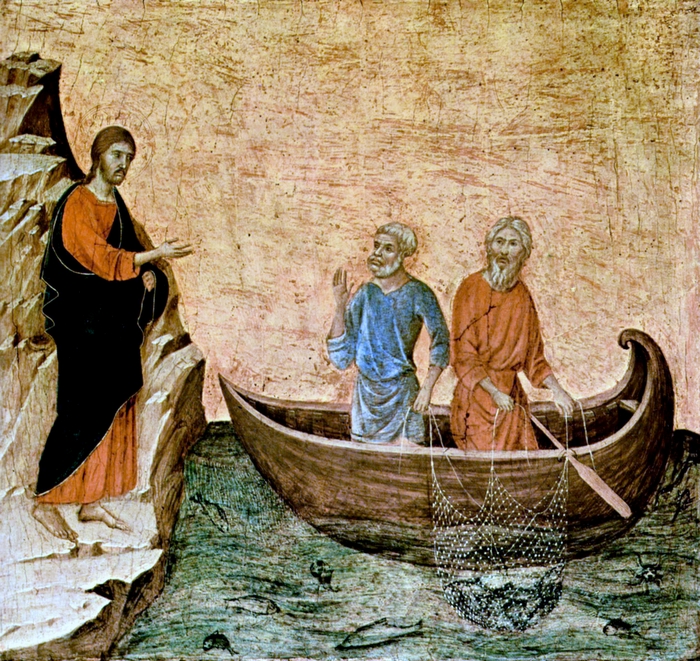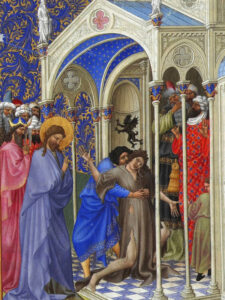Barekmor
Glory be to the Father, to the Son, and to the Holy Spirit
After St. John the Forerunner’s ministry came to a close, Jesus’ ministry began. In the Eastern Orthodox Church Theophany or Jesus’ baptism is immediately followed by a commemoration the following day of St. John the Baptist on the seventh. St. John participated in the baptism and after this we read very little of him throughout the rest of the Gospels. In one sense the ministry has now been passed from the Old Covenant to the New Covenant.
We see Jesus preaching a very similar message to the one that John the Baptist had begun. “Repent for the kingdom of heaven is at hand and believe in the Gospel.” The pains of repentance must come first, before we can have the joy of a holy conscience. St. Jerome likens this to what we see in nature – bitterness of medicine in order to have good health, nuts must be shelled before we can enjoy them, the expectation of gain makes pleasant the perils of the sea and several other examples. If we want to be holy, we have to pay the cost.
As He begins His ministry, He calls His First disciples. The Fathers point out the great mystery of who he picks. It isn’t people of grandeur, wealth or even an honoured profession – it was fishermen. Men who did not have that great a grasp on language. (The Gospel of St. Mark is believed to have been dictated by St. Peter has some of the poorest Greek in the New Testament.) Even today, in our own society, professional fishermen are looked down as ones not being exceptionally bright or well educated. Consider the number of Newfie jokes and to a lesser extent the Maritimer ones.

St. Eusebius tells us that God choosing these lowly men reveals the grandeur of His nature. He came from heaven and taught and sent out the very lowest of society to establish His kingdom. Thinking it good to use the most unsophisticated of men, he taught the world of this salvation and of our Christian religion. As St. Paul would later testify, it is not by clever arguments but the power of God that our faith rests in.
Their effectiveness as we know from studying Church history was phenomenal. Origen who lived a mere 200 years later testifies of it.
And we may see, moreover, how that religion itself grew up in a short time, making progress by the punishment and death of its worshippers, by the plundering of their goods, and by the tortures of every kind which they endured; and this result is the more surprising, that even the teachers of it themselves neither were men of skill, nor very numerous; and yet these words are preached throughout the whole world, so that Greeks and Barbarians, wise and foolish, adopt the doctrines of the Christian religion. From which it is no doubtful inference, that it is not by human power or might that the words of Jesus Christ come to prevail with all faith and power over the understandings and souls of all men.1
These fishermen left everything, even their very livelihood for following Christ. The fathers tell us that in the Scriptures that any relations too dear or trades are to be left behind for the Lord’s sake. We see this not only in the calling of the disciples in the Gospels but also in the calling of Elisha and others among the prophets.
The Fathers, furthermore, caution us against being hesitant to leave our livelihoods because of our parents and children. Some of you have probably been faced with that dilemma to a certain extent when you came here. Personally, I have been privileged in that my being involved in ministry is something that pleases my parents, but I know that is not the norm. Metropolitan has various examples of the difficulty in several of his books. Tertullian tells us that none of those that the Lord chose ever said, “I have no means to live.” We can also be confident that this will be true for us as well if we continue in our calling. I am reminded of Hudson Taylor’s famous quote:
God’s work done in God’s way will never lack God’s supply
We make a beginning in following our calling from the Lord, by imitating the example of these first disciples. They left livelihoods and families, but the principle is that we leave anything and everything to follow our call. This is going to look different for each person.
It could be property and wealth. This was the case for C. T. Studd and I think for the whole of the Cambridge seven. They had great wealth, but they gave it up to follow Christ’s call to share the love of Christ to the millions in China.
It could be social class. I think of Florence Nightingale. Nurses of her day were from the lower classes, but she followed the call to minister to the sick, injured and dying. Reflect today in following Christ’s call what does it require you to give up? What is impeding you in following wholeheartedly after Him? St. Jerome reminds us that the focus is not what they left but what they found.
They left their father of the flesh to follow the Father of the Spirit. They did not leave a father; they found a Father.2
From that day forward the disciples followed him closely and resolutely and didn’t depart from Him. They made their home in following Him through the countryside of Palestine and listening to His teaching. Let us today make a home for Him in our hearts where He may come among us and teach us.
Continuing on in the passage, he enters Capernaum where he casts out demons and heals the sick. Notice, the order though, first, He casts out demons and then He heals the sick. His first healing medicine is in operation against the means that death entered the world and then he deals with its effects in sickness. The root problem is first dealt with and then the symptoms.

We see the demons making, as it were, a confession of faith. However, this confession did not result in salvation. Why is that? The fathers point out several reasons.
First, they confessed Christ under compulsion. As we can see here in this passage, it is a confession of fear. “Have you come to destroy us?” Salvation comes through a confession of the free will.
Second, the confession must not be merely words but also the affections of the heart. Here after the confession, Christ rebukes the demon. Later, when St. Peter makes a similar confession he is blessed. The difference is that He spoke in love and the demons in fear. St. Augustin tells us, “Only the faith that works by love is faith.” In addition, Augustin also says, “Faith is mighty, but without love it profits nothing. The devils confessed Christ, but lacking charity it availed nothing.”
Third, even though what they said was true, it came from an unrepentant and unclean mouth and heart. Christ did not wish that the truth should proceed from such a source lest it should be mingled with the malicious desires of the evil one. To sum up, confession needs to be of free will, it must be spoken from love, and it must be spoken from a repentant and clean heart.
Even though this confession was spoken from unclean lips it still proves the truth as St. Irenaeus explains,
…all thus indeed seeing and speaking of the Son and the Father, but all not believing [in them]. For it was fitting that the truth should receive testimony from all, and should become [a means of] judgment for the salvation indeed of those who believe, but for the condemnation of those who believe not; that all should be fairly judged, and that the faith in the Father and Son should be approved by all, that is, that it should be established by all [as the one means of salvation], receiving testimony from all, both from those belonging to it, since they are its friends, and by those having no connection with it, though they are its enemies. For that evidence is true, and cannot be gainsaid, which elicits even from its adversaries striking testimonies in its behalf.3
In short, truth gets borne out by both its enemies and its friends.
The healing took place in the town of Capernaum on the Sabbath. St. Jerome tells us that Capernaum means town of consolation and the Sabbath means rest. Therefore, he was healed through consolation and rest just as the human race under bondage since Adam was healed from every uncleanness through consolation and rest.
Let us endeavour to follow Christ’s command and repent and believe. Metropolitan Athanasius recently shared that an attitude of repentance needs to be maintained even if we are currently aware of a sin. We need to be praying the Jesus prayer often, “Lord Jesus Christ, have mercy on me a sinner.”
In our call, in following Christ, let us look and see if there is anything hindering us from following Christ closely. In certain seasons of our life this may look different than other seasons of our life. At certain points there have been certain activities that I have not been able to participate in because they were hindering my spiritual growth, at other times I had the freedom to participate in these things. We must remember the maxim, “Others may, but I cannot.” Examine your life and see if there is something that is hindering you from following Christ.
We must also look to our confession. Are we confessing Christ because we love Him or are we confessing Him another reason? If it is no longer out of love, we must repent and ask God to restore our love for Him. We remember Christ’s warning to the Church in Ephesus, “Remember therefore from whence thou art fallen, and repent, and do the first works; or else I will come unto thee quickly, and will remove thy candlestick out of his place, except thou repent.”
Finally let us rejoice that we and the human race were healed through consolation and rest.
In the name of the Father, of the Son, and of the Holy Spirit
~ Fr. Matthew
1 Alexander Roberts, D.D. & James Donaldson, LL.D Editor, Ante-Nicene Fathers, Volume 4, Tertullian Part Fourth; Minicius Felix; Commodian; Origen Parts First and Second, originally published in the United States by the Christian Literature Publishing Company, 1885 (Peabody, MA: Hendrickson Publishing Marketing, LLC), 350
2 Thomas C. Oden and Christopher A. Hall Editors, Ancient Christian Commentary on Scripture New Testament II (Downers Grove, IL: InterVarsity Press, 1998), 19
3 Alexander Roberts, D.D. & James Donaldson, LL.D Editor, Ante-Nicene Fathers, Volume 1, The Apostolic Fathers, Justin Martyr, Irenaeus, originally published in the United States by the Christian Literature Publishing Company, 1885 (Peabody, MA: Hendrickson Publishing Marketing, LLC), 469
Duccio, di Buoninsegna, d. 1319. Christ Calling the Apostles Peter and Andrew, from Art in the Christian Tradition, a project of the Vanderbilt Divinity Library, Nashville, TN. http://diglib.library.vanderbilt.edu/act-imagelink.pl?RC=49261 [retrieved May 5, 2020]. Original source: www.yorckproject.de.
Limbourg Brothers. Jesus Casts Out the Unclean Spirit, from Art in the Christian Tradition, a project of the Vanderbilt Divinity Library, Nashville, TN. http://diglib.library.vanderbilt.edu/act-imagelink.pl?RC=56401 [retrieved January 13, 2021]. Original source: https://commons.wikimedia.org/wiki/File:Folio_166r_-_The_Exorcism.jpg.